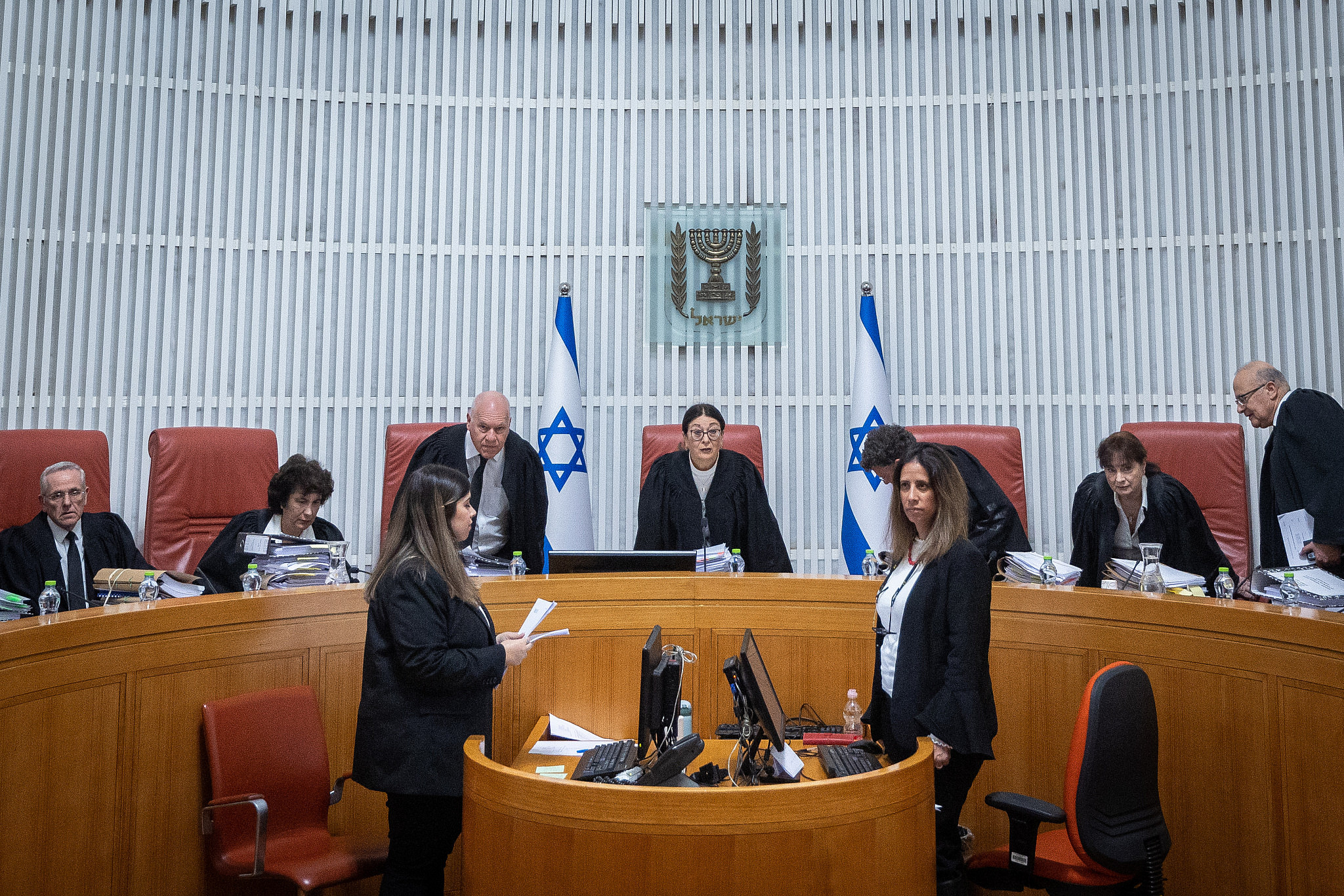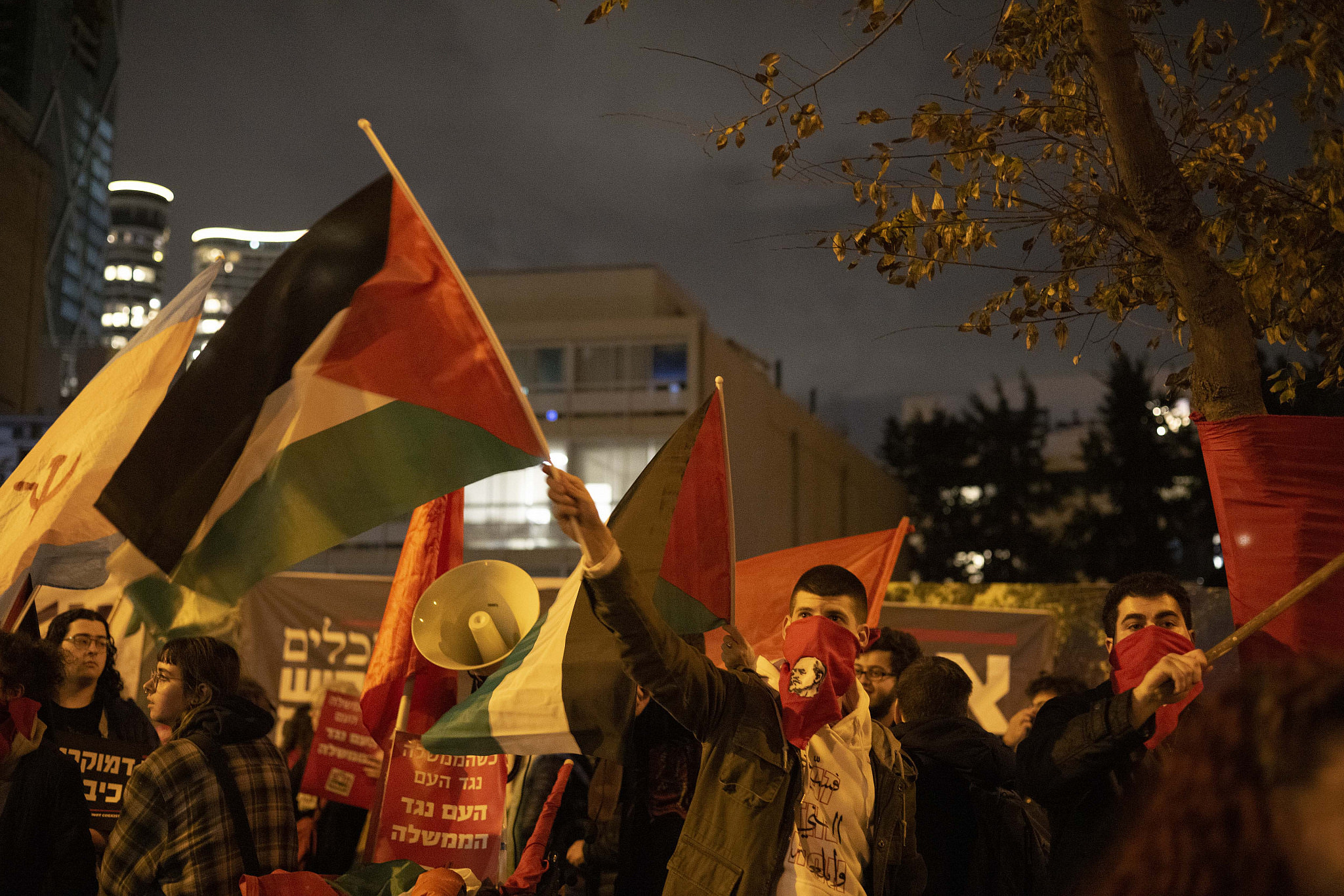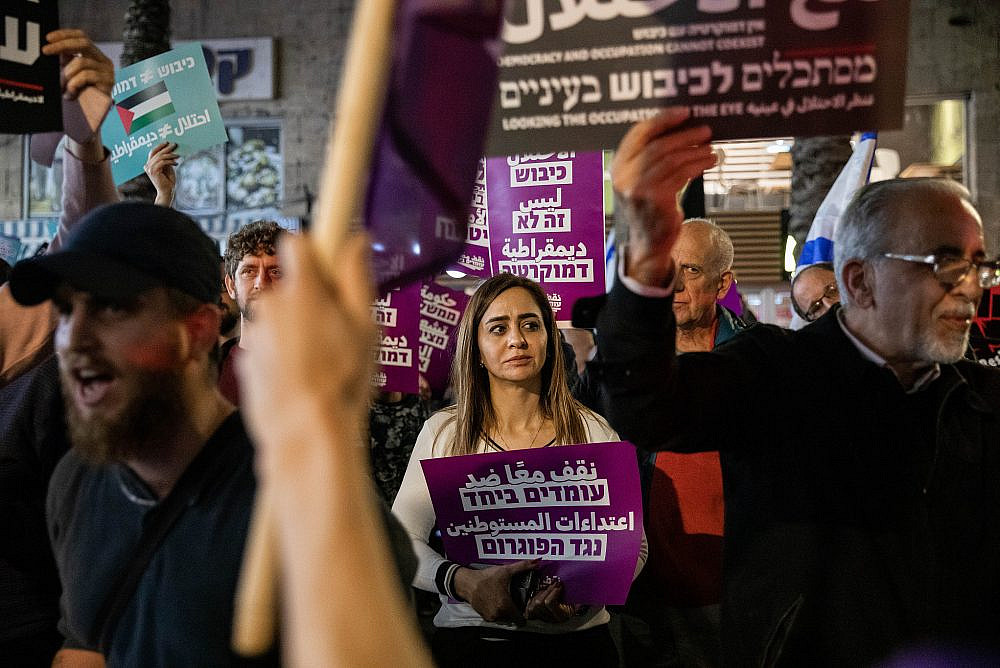The Palestinian Arab public in Israel has had very mixed and complex feelings about the mass protests against the far-right government’s plans to overhaul the judiciary. On the one hand, the hundreds of thousands of Israeli Jews filling city squares and streets every week have been surprisingly persistent, inspiring appreciation, reflection, and even a modicum of jealousy.
On the other hand, it isn’t easy for Palestinians to watch what appears like a nationalist Flag March washing over the country. True, this movement is not the same as the vulgar and violent march that takes place annually on Jerusalem Day, and thankfully, no one at the current protests is dancing and singing “may your village burn” or “death to Arabs.” And yet, the Zionist tsunami that longs for the Israeli days of yore makes it exceedingly difficult for Palestinian citizens to join. Difficult, but not impossible.
Every Palestinian citizen is fully aware and terrified of the very real danger posed by this fascist government’s “judicial reforms.” The fact that we are not joining the protests does not reflect indifference or complacency on our part. In fact, Palestinian activists and intellectuals have been in deep and continuous conversations in their social networks and the media about the movement and what our place should be in it. And the massive protests, despite our absence, do receive sympathy from large parts of Arab society.
Still, this government scares us for reasons that have little to do with the judicial system, yet are hardly on the minds of most Israeli Jews taking to the streets. For one, the person in charge of dealing with Palestinian citizens’ most painful concern — crime and gun violence — is National Security Minister Itamar Ben Gvir, who has made it clear that inflicting further harm upon the Arab community is at the top of his priorities. From demolition orders and fines for illegal construction, to encouraging armed Jewish militias in so-called “mixed” cities and regions, the minister has shown that he is preparing the country for a reboot of the violent events of May 2021. The stench of this hostile government hangs over our heads in every aspect of our lives.
This is not to say that the fight for the judiciary isn’t important; the likely flood of discriminatory and racist legislation that will follow from the “reforms,” stripping Palestinian citizens of a legal means to challenge them, is on the minds of many. Yet the Israeli judicial system has never been good to Palestinians. Time and again, the courts have surrendered to, if not actively promoted, the dictates of Zionist philosophy in everything that touches the core of the conflict.

In countless convoluted rulings, the Supreme Court itself has consistently granted legitimacy to trampling Palestinian human rights, especially for those living under occupation, and has upheld numerous laws targeting Palestinians living inside the Green Line. In view of this reality, many Palestinians view the fight over the fate of the judicial system as an inherently inter-Jewish one, with the opposition movement simply seeking to maintain the fictional idea that Israel is a “Jewish and democratic” state — a struggle in which we Palestinians have no place.
Three camps
Seeing all this, three main camps of thought have emerged among Palestinian citizens on how to respond to the anti-government protests. The first camp believes that the current political crisis helps show the true face of Israel, which we, as Palestinian citizens, have been well acquainted with for 75 years. They argue that this moment will reveal the ugly face of Israeli democracy to the world, thereby weakening its economy and its status in a world that has long ignored the occupation and its crimes. This, they hope, could be a step toward the demise of international support for the Zionist project, all while internal instability brings about the collapse of the state.
Many Palestinians critiquing this approach, however, are wary that in the absence of a real movement uniting and organizing us, Palestinians themselves will be the ones to pay the heaviest price for this crisis. As Israel’s fascistic rule becomes ever more aggressive, Palestinians will likely suffer even more from brazen army invasions like those in Nablus, Jenin, and Jerusalem, and from the state speedily consolidating more facets of the occupation at our expense. Moreover, many have grown cynical of the idea that the Israeli government will be deterred by international shame and a strengthened boycott movement; beyond words of condemnations and concern in language slightly sharper than in the past, we should not expect any real intervention from the world.
Most read on +972
A second camp is made of Palestinian citizens who have come to the conclusion that a shared existence with Jewish Israelis is our fate, even if not fully on our terms. They say that we were born in this state, for all its grotesquery and the destruction it has wrought upon us as a people, and that for now, as the entity administering our lives, we have to work with what we have.
Many people in this camp believe that we must fight to prevent things from getting even worse. After all, the settler right that runs this government doesn’t want calm — they want war. And while these Palestinians recognize the deeply problematic nature of the current demonstrations, they still believe the racism of the government far outweighs that of the protesters. Thus, they see their best shot as trying to carve out a place for themselves in the demonstrations, hoping for a few more Palestinian flags and Palestinian speakers.

The third camp of Palestinian citizens sees this movement as a historic one in the conflict, and who, like the Israeli radical left, want to open it up to talk about everything — the connection between corruption and the settlements, between dictatorship and occupation, between the Jewish Nation-State Law and other anti-democratic legislation, and so on. This group wants to protest in favor of democracy for all, a state not defined by Judaism or Zionism, but a state for everyone. And they believe that now is the time because more and more Jews are beginning to understand the connection between the occupation and the government’s blatant Jewish supremacy.
One of the biggest problems for this camp, though, is that the Palestinian leadership inside Israel is utterly neutered and divided, lacking the organizational ability to mobilize society and bring about its own mass opposition against the government and its oppressive apparatuses. This camp sees a need for a brave new leadership, one that will organize a parallel protest movement and muster the strength to join forces with Jewish citizens who understand who their true partners are in the struggle for democracy and equality.
A version of this article was first published in Hebrew on Local Call. Read it here.






